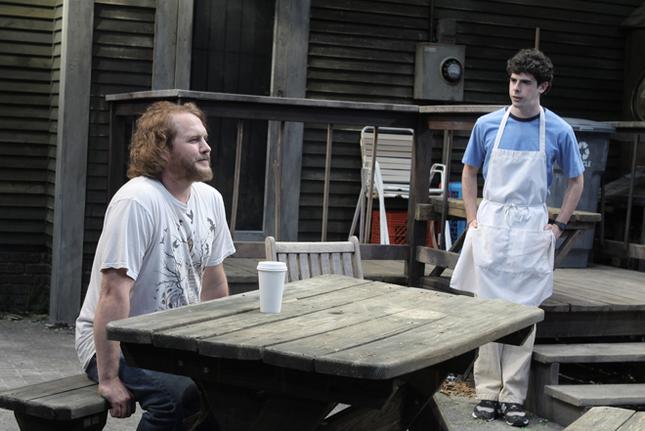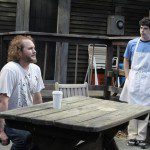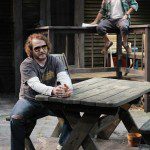“The Aliens” at Studio Theatre
By • November 21, 2012 0 2076

With the current production of “The Aliens” at the Studio Theatre, Washington theatergoers will have had an opportunity to take in the entire output of the very hot, young playwright Annie Baker-although she’s said to be working perhaps not surprisingly on a translation of Chekhov’s “Uncle Vanya” and a new play is slated to debut in New York in January.
In photographs of her, the overall impression-while attractive-seems slight and wispy, and that also is the initial impression you might get of her plays—”Circle Mirror Transformation”, staged at the Studio several years ago, “Body Awareness”, staged as Theater J’s season opener this year, and now “The Aliens”. Insofar as Ms. Baker is concerned, that is probably a misleading impression. With her plays, it’s a wrong impression, although that’s not so obvious to the naked mind or heart. Certainly her track record-numerous awards including Obies and Outer Circle Critics Awards-and critical acclaim almost everywhere her plays have been staged-belies any sort of lack of depth and power.
Baker’s work is tricky and sneaky. It has a cumulative effect, like a junk yard dog at the pound you don’t immediately think of rescuing, let alone loving. It’s an odd process, watching one of her plays—you get twitchy with impatience almost right from the start—until there comes a point where you’re nailed to your seat with angst and alarm, the glue being an odd sort of empathy.
It isn’t that Baker simply abandons traditional dramaturgy. Each of the three plays has a requisite number of secrets that emerge with varying degrees of power. The secrets, while effective and punchy dramatically, are almost beside the point. It’s the characters and language that count and one of Baker’s gifts is to be able to articulate, with realism, poetry and humor, the general inarticulateness of American personal communication and interaction. She has her thumb on what it’s like to be alive in today’s world.
She is also a writer who manages to work from a particular locale and region. William Inge’s Midwest comes to mind in her case. New England generally and suburban, small-town Vermont in particular and make the specific universal. The members of an amateur acting class in “Circle Mirror Transformation”, the lesbian couple living in a small university town, and now the two classic slackers hanging out barely in the back of a restaurant in “The Aliens” are specific to a place, but we already know them, and recognize them.
That’s important, because Baker-although she can be funny, and knows her way around emotional combat zones, doesn’t necessarily make it easy for audiences, if not critics. That’s especially true with “The Aliens”, while it has beautifully-and-smartly written dialogue, also has great big patches of silence in which no one says anything, in which you can hear and see the characters breathing. This can be a stretch for some audiences used to bang-bang writing, or evocative language, or yelling and screaming familial battles. Beckett comes to mind, but not so much Mamet or Shakespeare where the rest is silence not the beginning.
“The Aliens” is a three-character play, and we first see two of them, KJ and Jasper, in the back of a delapitated restaurant, amid garbage cans and a degraded old wooden table-bench-chair ensemble. KJ, looking a little like a ragged, undersized beached whale, is lying on top of the table, nearly out cold, sometimes humming, but otherwise not saying a word. Jasper, tall, thin, with a ragged beard like his chum, is pacing nervously, chain-smoking some odious cigarettes.
Nothing happens for quite a while. Jasper paces, KJ breathes in and out, with the hums. It seems almost that Baker is testing the boundary line where some people might walk out. Certainly people fidget. Anyone would. Silence may be golden but its not sacred.
But they do begin to talk about things: Jasper’s breakup with his girl, about Charles Bukowski the poet, about a friend of theirs that lives on a wind farm. These two you recognize as slackers who define the word, thirty somethings, lost and vaguely creative. They used to haves a rock band called-tadah-“The Aliens”-and Jasper is working on a novel quite seriously. He reads a lengthy, steamy sex scene from it to KJ who admits to getting aroused.
Along comes Evan, a high schooler who appears to be nervous about them being in the back. “It’s not allowed,” he says, but Evan too is something of a wayward spirit, fearful of a lot of things, he’s also part of a nearby music camp. Soon enough, Evan, wisely, sharply played with smart confusion by Brian Miskell, ends up under their spurious and quite scorched wings.
The first act can be trying, because it clearly sets up the second act, which is devastating. To varying degrees, this has been Baker’s process in her other two plays. Something happens–can’t say what–and life changes like it always does, and yet, things remain difficult to say, to express, but still: this time, in addition to long periods of silent breathing, you can hear hearts in pain, wanting to scream, dance or sing something perfectly. They can’t of course, but they try, they always try in Baker’s world.
In a play like this, the audience watches everything like a hawk for clues. Young women seem charmed by the guys. Thirty-something guys seem to retreat into themselves, whether they’re alone or not. It was a guy with a purple tie who jumped out of his seat at the end, clapping.
In the end, “The Aliens” is like a mystery play. It seems to be true to life. The characters in the play keep trying to fill in gaps in language. They reach for words that elude them, but you can see them reaching. The kid’s words—when others don’t come—are always “um…cool”, still the catch-all words of at least three generations.
Watching this play is like crawling through a minefield with a spoon. You’re afraid it, they and you, are going to blow up. Scott McKenzie as KJ and Peter O’Connor as Jasper convey their dusty, long friendship with such art that, led by director Lila Neugebauer, almost everyone finishes the journey safely, accompanied by the shedding of, not blood, but heartfelt emotions.
(“The Aliens” is now at the Milton Theatre at the Studio)
- Scot McKenzie and Brian Miskell in The Aliens. | Scott Suchman
- Scott Suchman



